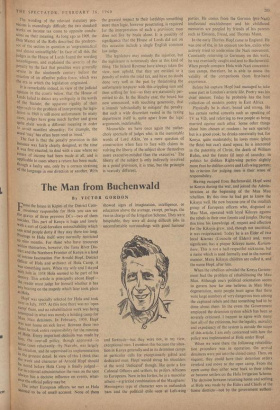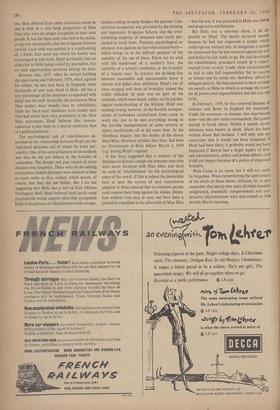The Man from Buchenwald
By VICTOR GORDON
pom the house in Kipini of the District Corn- responsible for Hola you can see the graves of three previous DCs—two of them suicides. This part of Kenya is huge and lonely With a sort of God-forsaken untouchability which can send people dotty if they stay there too long. Postings to Hola itself were normally restricted to nine months. For those who have resources Within themselves, however, the Tana River Dis- trict and the Northern Frontier of Kenya is a land °I‘ intense fascination. For Arnold Hopf, District Officer of Hola and architect of Hola Camp, it Was something more. When my wife and I stayed With him in 1958 Hola seemed to be part of his ciLestinY. This article is principally about Hopf- tne reader must judge for himself whether it has any bearing on the tragedy which later took place Ett Hoia.
Hopf was specially selected for Hola and took over in July, 1957. At this time there was no 'open eallIP' there, and no rehabilitation work was being :Lttempted in what was merely a holding camp for mau Mau detainees. In February, 1959, Hopf Was sent home on sick leave. Between these two dates he took entire responsibility for the running " Hola. Every important decision was made by him; the over-all policy, though approved—in some cases reluctantly—by Nairobi, was largely hIS creation, and he supervised its implementation ill the greatest detail. In.view of this I think that the work and character of Arnold Hopf should noted before Hola Camp is finally judged_ 'or in colonial administration the man on the spot always has a decisive influence on events, what- ever the official policy may be. The other European officers we met at Hola Seemed to be of small account. None of them
showed signs of imagination, intelligence, or education above the average, except, perhaps, the two in charge of the Irrigation Scheme. They were hospitable, they were all doing difficult jobs in uncomfortable surroundings with good humour
and fortitude—but they were not, in my view, exceptional men. I mention this because the situa- tion in Kenya generally and in its detention camps in particular calls for exceptionally gifted and dedicated men. Hopf would shrug his shoulders at the word 'dedicated' though, like quite a few Colonial Officers and settlers, he prefers Africans to Europeans. Now In his forties, he is a muscular atheist--a grizzled combination of the Maugham/ Hemingway type of character seen in outlandish bars and the political exile seen at Left-wing
parties. He comes from the German (pre-Nazi) intellectual establishment and his childhood memories are peopled by friends of his parents such as Einstein, Freud, and Thomas Mann.
In the early Thirties Hopf came to England. He was one of the, in his opinion too few, exiles who actively tried to undermine the Nazi movement. Constantly returning to Germany on this work, he was eventually caught and sent to Buchenwald. When people compare Hola with Nazi concentra- tion camps, therefore, he is able to assess the validity of the comparisons from first-hand experience.
Before his capture Hopf had managed to take some part in London's artistic life. Poetry was his chief interest. Today he probably has the best collection of modern poetry in East Africa.
Physically he is short, broad and strong. He has certain verbal conceits such as speaking of TV as VD, and referring to two people as being married against each other. Some other things about him chosen at random : he eats sparsely but is a good cook; he drinks convivially but, for Kenya, quite moderately; he loves music (plays the flute) but can't stand opera; he is interested in the paternity of Christ, the death of William Rufus, and the future (if any) of anarchy; in politics he dislikes Right-wing parties slightly more than he dislikes centre and Left-wing parties; his criterion for judging men is their sense of responsibility.
Having escaped from Buchenwald, Hopf went to Kenya during the war, and joined the Admin- istration at the beginning of the Mau Mau rebellion. By this time he had got to know the Kikuyu well. He now became one of the smallish group of European officers who, disguised as Mau Mau, operated with loyal Kikuyu against the rebels in their own forests and jungles. During this time his knowledge of, respect and affection for the Kikuyu grew, and, though not uncritical, it was reciprocated. Today he is an Elder of two local Kiamas (Councils of Elders) and, more significant. has a proper Kikuyu name, Karim- bare. This is not a half-respectful nickname, but a name which is used formally and in the normal manner. Many Kikuyu children are called it, and the name Hopf, after him.
When the rebellion subsided the Kenya Govern- ment had the problem of rehabilitating the Mau Mau. Although one's political orientation seems to govern how far one believes in Mau Mau degeneration, most people must agree that there were large numbers of very dangerous men among the captured rebels and that something had to be done about them. In the event the Government employed the detention system which has been so severely criticised. I happen to agree with many (not all) of the criticisms, but the legality, morality and expediency of the system is outside the scope of this article. I am only concerned with how the policy was implemented at Hola under Hopf.
When we were there the following rehabilita- tion procedure was in operation. On arrival detainees were put into the closed camp. Then, on request, they could have their detention orders revoked and move to the open camp. From the open camp they either went back to their tribes or became settlers on the Hola Irrigation Scheme. The decision between returning home and settling at Hola was made by the Elders and Chiefs of the home districts—not by the government authori- ties. Hola differed from other detention camps in that it took in a very large proportion of Mau Mau who were no longer acceptable to their own people. It was for these men who had to be exiled, at any rate temporarily, that the Irrigation Scheme catered. Each exile was entitled to a smallholding of, I think, four acres (on which his family was encouraged to join him). Hopf personally had no objection to Hola being visited by journalists, but no such opportunities occurred during his time.
Between July, 1957, when he started building the open camp and February, 1959, when, against his wishes, he was sent back to England, some thousands of men were freed at Hola. All but a tiny percentage of the detainees co-operated with Hopf and his staff. Ironically the prominent Mau Mau leaders were usually easy to rehabilitate, while the `hard core' detainees were mostly men who had never been very prominent in the Mau Mau movement. Hopf believes that non-co- operation is due more to a mental condition than to a political attitude.
The psychological side of rehabilitation de- pended on the relationship between Hopf and the individual detainees (all of whom he knew per- sonally). One of the central features of his methods was that he did not believe in the benefits of confession. The dossier and past record of every detainee was forgotten. There were no de-oathing ceremonies; indeed detainees were allowed to take as many oaths as they wished, which meant, of course, that they did not bother. But I am not suggesting that Hola was a sort of East African Dartington Hall. Hopf believed (and surely most psychiatrists would support him) that occupation helps in the process of rehabilitation while occupa- tionless rotting in camp hinders the process. Con- structive occupation was provided by the exciting and impressive Irrigation Scheme and the over- whelming majority of detainees were easily per- suaded to work there. Pressure, psychological or physical, was used on the few who resisted work— which brings us to the difficult question of the morality of the use of force. Force can be used with the tenderness of a mother's love, the austerity of a school's traditions, or the brutality of a 'master race.' In practice the dividing line between reasonable and unreasonable force is narrow and defies close definition. Hopf's use of force stopped well short of brutality; indeed the wilful infliction of pain was no part of his methods, which were based, rather, on his psycho- logical understanding of the Kikuyu. Hopf sees nothing wrong, however, in the forcible transpor- tation of individual recalcitrants from camp to work site, just as he sees everything wrong in the forcible transportation of some seventy or eighty recalcitrants all at the same time. At the Mombasa Inquiry into the deaths of the eleven Mau Mau, detainees testified that there had been no ill-treatment at Hola before March 3, 1959 (e.g. during Hopf's regime).
It has been suggested that a number of the detainees in Kenya's camps are innocent men who were never involved with Mau Mau, and have no need of 'rehabilitation' (in the psychological sense of the word). If this is indeed the deplorable fact, at least the system of easy repatriation adopted at Hola ensured that no innocent person need remain there long against his wishes. Deten- tion without trial may or may not have been a justifiable expedient in the aftermath of Mau Mau —but the way it was practised at Hola was liberal and progressive and humane.
But Hola was a one-man show; it all de- pended on Hopf. The deaths occurred mainly because he had not organised a system which cotild operate without him. In mitigation it should be mentioned that he was removed against his will and before he felt ready to go. He had developed his rehabilitation procedure (much of it experi- mental) from scratch. Under these circumstances he had to take full responsibility for its succcss or failure and he could not, therefore, afford to delegate powers. He had expected to have another six months at Hola in which to arrange the trans- fer of powers and responsibilities, but this was not to be.
In February, 1959, he was removed because of sickness and flown to England for treatment. Under his successor—a younger, less experienced man—and the new camp commandant, the system started to break down. Within a month eleven detainees were beaten to death. Much has been written about that incident. I will only add mY conviction that it would not have happened if Hopf had been there; it probably would not have happened if Kenya had a larger supply of first- rate administrative, police and prison officers; and it did not happen because of a policy of organised brutality.
Hola Camp is no more, but it will not easily be forgotten. When remembering the anniversary of the death of those eleven Africans, let us also remember that nearly two years of single-handed, enlightened,, essentially compassionate and con- structive administration were also erased on that terrible March morning.



































 Previous page
Previous page